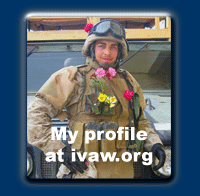After the government had three and a half months to prepare their case against those of us challenging our arrests from September 15th, the case finally went to trial January 3rd. Sort of.
One of my ten codefendants, Sholom Keller had come down from Philadelphia the day before and was staying at our new house in the Petworth neighborhood where our new office is set up. S***** ***** (an active duty US Army soldier and member of IVAW) who had been present on September 15th came up from Pensacola as a witness. (Actually, she was really here for the New Year’s Eve party at the house.)
We began the day by checking in with the clerk in courtroom 120 where the judge decided his docket was too full for the day and sent us upstairs to another judge who apparently had his entire day to waste on our case. From the beginning, Judge Greene seemed to be looking for an excuse to throw out the case, but at the same time was having enough fun playing with the prosecutor to let things play out in the name of due process.
After the hired attorneys made their opening statements I made mine. Had I been as eloquent as I had planned and not been interrupted by the judge, it might have sounded something like this:
“On September 15th a mass of American citizens gathered at the US Capitol to petition their government for a redress of grievances with a symbolic demonstration. As a former Marine who swore an oath to support and defend the Constitution, I have a particular appreciation for the rights it guarantees. As a member of Iraq Veterans Against the War who has spent a fair amount of time on Capitol Hill, I also have a particular appreciation for the difficult job that the United States Capitol Police have in marking the fine line between freedom of speech and maintaining order and security at the Capitol. Sometimes, it is civilians who cross this line, sometimes deliberately to make a point. But sometimes it is the police that cross this line and in the interest of preserving the rights of the people enshrined in the first amendment, that line must not be allowed to shift at the whim of whomever is on duty at the time. The evidence will clearly show that on September 15th, in my case, the police crossed that line, and not I.”
I had done a fair amount of prepwork to make sure that the video and photo evidence I had would be presented properly, and was a bit disappointed that I didn't get the chance to use it, but it was part of our "show of overwhelming legal force" and aside from tying up a courtroom for the day, we also made it very unpleasant to work for the government.
The rest of the synopsis is below in the email that ANSWER sent out:
Sept. 15 arrestees win at trialGovernment case collapses during trial -- judge dismisses all charges
An important victory was won today in the case of 11 defendants who were arrested at the Sept. 15 March on the Capitol, which drew 100,000 anti-war protestors to Washington, DC.
Judge Henry Greene of the Superior Court of the District of Columbia dismissed all charges against the defendants, who were accused of crossing a police line. The government's case collapsed in the early stages of the trial during the testimony of a witness from the Capitol Police.
Judge Henry Greene of the Superior Court of the District of Columbia dismissed all charges against the defendants, who were accused of crossing a police line. The government's case collapsed in the early stages of the trial during the testimony of a witness from the Capitol Police.
The protestors asserted that the government and the Capitol Police had illegally and unconstitutionally sought to prevent demonstrators from engaging in First Amendment protected speech and assembly in an area in front of the Capitol building routinely kept open to tourists and others. This attempt to exclude people engaging in free speech activities could not form the basis for a lawful arrest or conviction for "crossing a police line."
The government's case disintegrated as protestors' attorneys demonstrated that the government had withheld key evidence from the defense.
Under pressure from the defense, the government revealed that they had withheld documents and material that was central to the defendants' challenge to the government's efforts to prevent demonstrators from exercising their First Amendment rights at Congress under the pretext of "national security," including a "police sensitive" document supposedly related to "terrorism." The defense argued that the government was using this pretext to prevent antiwar protest at a time when General David Petraeus was making the Bush administration's case that Congress should continue to fund the Iraq war.
Many of the defendants represented themselves and were given pro bono legal counsel and advice from attorneys Michael Madden, Mara Verheyden-Hilliard of the Partnership for Civil Justice, Stephanie Snyder of the Georgetown Criminal Justice Clinic, and Harriet Adams. The defendants, including leaders from Veterans for Peace, the A.N.S.W.E.R. Coalition (Act Now to Stop War and End Racism), and Iraq Veterans Against the War, were Elliot Adams, Brian Becker, Ellen Barfield, Carla Boccella, Adam Kokesh, Jay Gillen, Rodney Centeno, Polly Miller, Sholom Keller, Shawn Peterson, and Rich Reinhart.

















